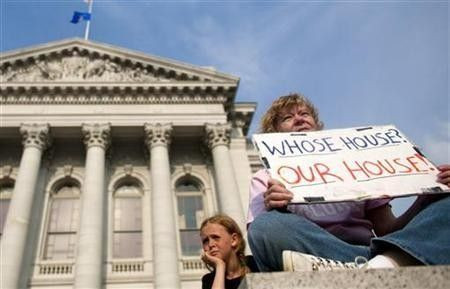Wisconsin Union Membership Plunges After Labor Law

A Wisconsin law that limited collective bargaining for local unions has led to a more-than 50 percent drop in membership over the past 15 months, the Wall Street Journal reported.
The state's second-largest union, American Federation of State, County and Municipal Employees, had membership fall to 28,745 in February from 62,818 in March 2011, the Journal said Thursday. The organization's Afscme Council 24, composed on state workers, fell more than two-thirds to 7,100 from 22,300 last year.
A key reason membership dropped was because the labor law, championed by Republican Gov. Scott Walker, forbids automatic collection of union dues. Instead, workers must voluntarily say that they want to continue paying dues to remain union members.
Union workers have also dropped out because of high pension and healthcare costs, and others believe that the unions are no longer influential.
The law's future is uncertain, however, as Walker faces a recall election on Tuesday. If Walker loses, it could reflect a backlash against the law, which workers have deemed excessive. On the other hand, a win would signal an acceptance of the law, and could possibly drive membership lower.
A Marquette Law School telephone poll of 600 likely voters, conducted last week, found Walker leading 52 percent to Mayor Tom Barrett's 45 percent, the New York Times said Thursday. The poll's margin of sampling error was plus or minus 4 percentage points for both men.
The Labor Department estimates Wisconsin had a total of 187,000 public union members last year, the most recent figures available.
© Copyright IBTimes 2025. All rights reserved.





















